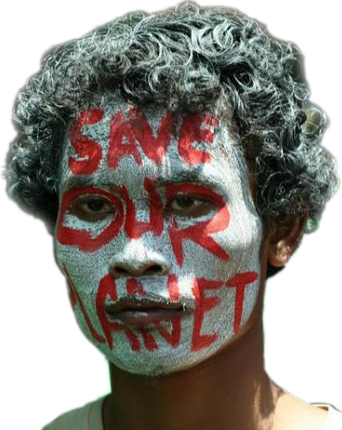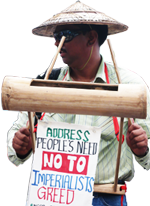Who we are
 The Peoples' Movement on Climate Change (PMCC) seeks to advance the People's Protocol on Climate Change as the Southern peoples' strategy and response to the climate change issue.
The Peoples' Movement on Climate Change (PMCC) seeks to advance the People's Protocol on Climate Change as the Southern peoples' strategy and response to the climate change issue.
What we advocate
|
The Peoples' Protocol on Climate Change (PPCC) aims to involve the grassroots sectors in the climate change discourse by developing their capacities for engagement and action. It also aims to pressure governments and international bodies to put the people's perpectives and aspiration on the negotiating table in drawing up a post-2012 climate change framework. |
Arabic English Amharic Bengali Spanish Francais for printing |
Why we advocate

The people are the worst affected and yet are the least empowered. It is urgent, more than ever, for the people to unite and create their own spaces to raise their own concerns and issues on climate change.
Member Login
Syndicate
PPCC's five-point platform for action
- Comprehensive and concerted but differentiated and equitable global effort to achieve deep, rapid, and sustained emissions reductions to stabilize CO2 concentrations at 350ppm and hold global average temperature rise to 1.5 degrees Celsius.
- Demand the reparation of Southern countries and the poor by Northern states, TNCs, and Northern-controlled institutions to redress historical injustices associated with climate change.
- Reject false solutions that allow Northern states and corporations to continue harming the environment and communities, provide new and greater opportunities for profit, and reinforce and expand corporate control over natural resources and technologies.
- Struggle for ecologically sustainable, socially just, pro-people, and long-lasting solutions.
- Strengthen the peoples' movement on climate change.
| What is the Peoples' Protocol on Climate Change? |  |
 |
| Tuesday, 11 March 2008 19:29 |
|
The People's Protocol on Climate Change is a global campaign that aims to provide venue for grassroots, especially from the South - who are the worst-affected and yet are the least empowered to adapt to climate change - to participate in the process of drawing up a post-2012 climate change framework.
This is in light of the failure of the Kyoto Protocol in significantly addressing climate change and the failure of the COPMOP in expanding its process to include the concerns of the marginalized sectors. And in a situation wherein the representativeness of governments in terms of prioritizing the welfare of the majority of their constituents is questioned, it is urgent more than ever, for the grassroots to unite and create their own spaces to raise their concerns and issues on climate change.
The People's Protocol on Climate Change, through national and regional assemblies to be held through 2008, will gather feedback on measures being floated in the international climate change talks from the people, in addition to their demands. By reflecting the demands and aspirations of the people on climate change, the People's Protocol on Climate Change serves as an important tool by raising the major concerns of the grassroots that will place pressure on their governments to bring them to the climate change negotiating table. All these activities will lead up to the climate change meetings in Copenhagen in December 2009. How did it come about? The call for a People's Protocol on Climate Change was one of the resolutions of the climate change workshop during the Asia Pacific Research Network's conference on natural resources in Bangkok, Thailand on October 2007. The body, composed of almost 170 participants from all over the Asia Pacific region, unanimously supported the idea. The summaries of resolutions were:
Has the process started? The resolutions arrived at during the APRN conference provided the basis for the initial draft of the Protocol. Workshops were held in different parts of Indonesia to gather feedback on the draft Protocol. During the United Nations Framework Convention on Climate Change in Bali, Indonesia, two more workshops were held- in Denpasar Bali and the Indigenous People's Meeting in Sumber Klampok in East Java which came up with the Sumber Klampok Declaration. On December 10, 2007, International Human Rights Day, a total of five thousand rallyists supported the call for a People's Protocol on Climate Change and the need for a sustainable development and people's sovereignty on natural resources A signature and online petition campaign was also started. Individuals and organizations are also encouraged to comment on the draft through this website. National and regional assemblies will be held throughout the year which will all lead up to the People's Assembly on Climate Change on December 2008, in time for the COP14 meetings, wherein the final People's Protocol on Climate Change will be presented. The following year will be lobbying work for governments to bring the Protocol to the Copenhagen climate change negotiating table in December 2009. What is the People's Assembly on Climate Change The People's Assembly on Climate Change will be the main space for Southern and Northern CSOs during the COP14 meetings in Poznan, Poland. Parallel activities such as workshops, press conferences and cultural events will be held. The final People's Protocol on Climate Change will be presented and ratified during the Assembly. How can organizations and individuals join the campaign? Aside from the online petition and signature campaign, feedback on the draft Protocol is also being gathered through the Comments Page of this website. The schedule for the national and regional assemblies will be posted in this website soon. You may also want to hold national workshops or co-organize regional assemblies. We have materials that can be used and we may be able to provide resource persons. You may also join the global working committee. If interested to commit to the campaign in some other ways, please forward your comments, suggestions and queries to the Secretariat. Like it? Share it! |
Upcoming Events
03 December 2011
11:30 - 13:30
Improving Development Effectiveness in Climate Financing: Challenges and Opportunities


